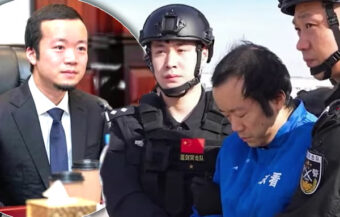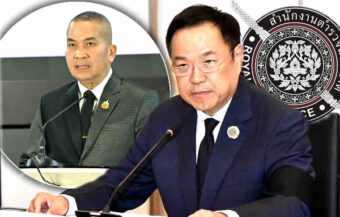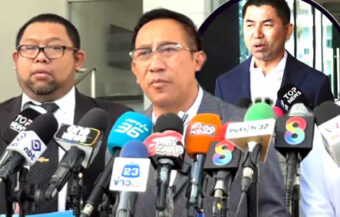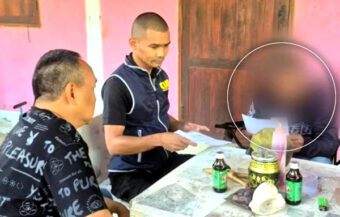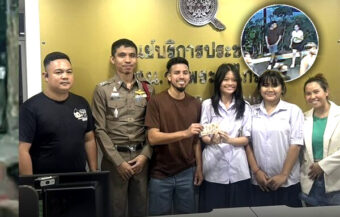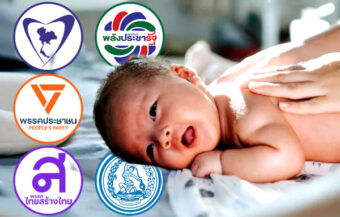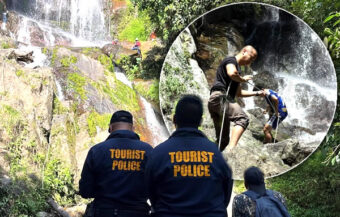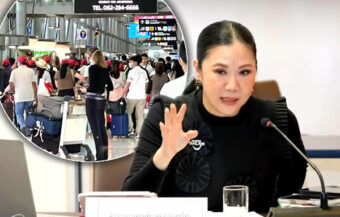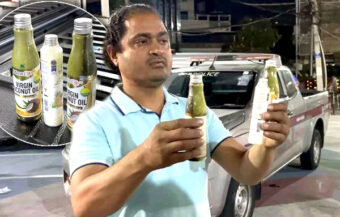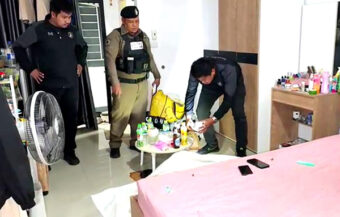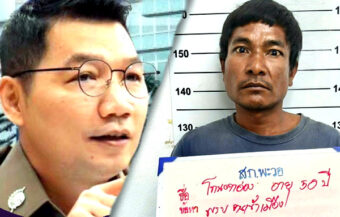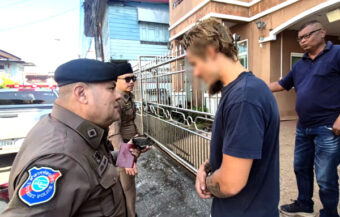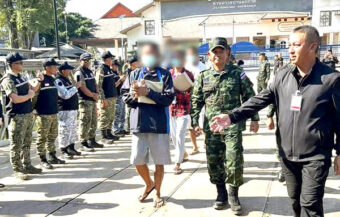Trump freezes new student visa interviews worldwide, sparking concern among Thai students. But ministry says existing US appointments remain valid. Thai students are seen as low risk as Washington expands social media checks to root out perceived threats.
A senior official at Thailand’s Ministry of Higher Education, Science, Research and Innovation (MHESI) on Wednesday urged Thai students with scheduled interviews at US consulates not to panic. His comments followed a decision by the Trump administration to suspend new visa appointments. The move comes amid a broader tightening of US security policies under President Trump, particularly targeting university campuses and left-wing student activism. Supachai Patumnakul, the ministry’s Permanent Secretary, confirmed that all existing visa appointments for Thai students will continue as planned. He also expressed confidence that Thai students would not be adversely affected by the changes. According to Supachai, Thai students travelling to the United States are generally less likely to be politically active or militant, reducing the likelihood of being flagged under new measures.
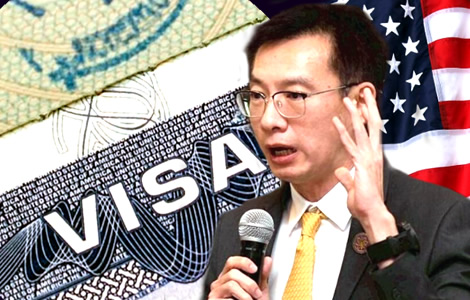
The Trump administration has suspended all new student visa appointments worldwide. The United States plans to tighten screening by expanding checks on visa applicants’ social media activity. Thai officials confirmed that, so far, the move has not affected Thai students. However, they are closely watching the situation.
On May 28, the Ministry of Higher Education, Science, Research and Innovation (MHESI) announced that it had received confirmation of the US decision. The order came from the State Department under President Donald Trump’s administration and instructed all embassies to stop scheduling new visa interviews for students and academic exchange participants.
Only those who already had appointments scheduled are currently allowed to proceed. Others must wait.
Thai ministry says existing appointments will go ahead but new student visa interviews are now suspended
According to Mr Supachai Patumnakul, Permanent Secretary of the MHESI, the measure is temporary. “From the information we’ve gathered, Thai students who already had interviews are not affected,” he said. “However, those who have not yet booked appointments will be delayed.”
The US has not cancelled visas already issued. Nor has it denied applications already in process. However, applicants who haven’t yet secured an appointment—including student, teacher, and exchange programme applicants—must now wait for new guidelines.
The United States is preparing to expand mandatory social media screening. The goal, officials say, is to assess whether potential visa holders harbour attitudes that could threaten US national security.
“Right now, the US is developing procedures to review social media content,” Supachai explained. “They are looking at expressions that show hostility or incite violence—especially views on war.”
Thai students are seen as low-risk while the US expands social media screening to detect potential threats
Importantly, Thai students are not seen as a risk group. Most are not politically active online, especially regarding sensitive topics.
“We have looked into this and, based on current information, Thai students have not engaged in such online behaviour,” said Supachai. “Therefore, we believe this policy will not affect them at this stage.”
Even so, he admitted the situation remains fluid. “It is essential that we monitor the situation day by day,” he said. “If new developments arise, we will act accordingly.”
Currently, several hundred Thai students are studying in the United States. Many are scholarship recipients—some funded by MHESI, others by the Civil Service Commission, government agencies, or private institutions.
Some students are preparing to begin programmes this summer or autumn. These students could face delays if the suspension continues.
Although the Ministry believes the disruption will be brief, it is preparing for contingencies. Officials are working with the US Embassy in Bangkok to gather information and assess risks.
“We are actively coordinating with the US Embassy,” Supachai said. “We are focusing especially on scholarship students who are due to travel soon.”
US embassies remove student visa slots while Thailand works to protect scholarship recipients from delays
The Ministry’s primary concern is that students will not encounter unexpected obstacles. “Right now, we cannot take action,” Supachai noted. “We must wait for the US to finalise its new procedures.”
Meanwhile, embassies and consulates worldwide have been ordered to remove all student visa slots from their calendars. A memo sent by Secretary of State Marco Rubio confirmed that existing appointments can proceed. However, new applications will be paused indefinitely.
Rubio’s memo also warned that tightening social media checks would have a “significant impact” on embassy operations. Screening all student visa applicants’ online presence will take time and resources.
For the Trump administration, the move fits a broader pattern. The White House has taken a hard line against foreign students. In recent years, it has revoked research visas, deported students, and frozen university funding.
Several of those actions were later blocked by US courts. Still, President Trump remains outspoken about his distrust of elite universities. He accuses some of fostering anti-Semitism and silencing conservative voices.
US policy shift follows Trump’s long-standing crackdown on foreign students and elite academic institutions
Harvard University, a long-time Trump target, had its right to host international researchers revoked last week. A federal judge quickly stepped in to block the policy.
Critics argue the Trump administration is using immigration policy to suppress dissent. Supporters claim it’s about security and fairness.
Speaking to reporters, US State Department spokeswoman Tammy Bruce said the measure is necessary. “We take the screening process for those coming into our country very seriously,” she said. “We will continue to do so.”
Under current US policy, all international students must attend an in-person visa interview before receiving approval. Many institutions rely heavily on tuition from foreign students, who often pay higher fees than domestic students.
Universities fear the current suspension could disrupt enrolments. More than 25% of students at top US institutions are international. Delays in visa processing could mean thousands miss programme start dates.
MHESI warns prolonged suspension could hurt Thai students hoping to begin studies in the coming semester
Supachai acknowledged this risk. “If the US keeps the suspension in place too long, students could lose opportunities,” he said. “That’s why we’re following developments very closely.”
At present, Thai students already studying in the US are unaffected. However, those planning to begin new courses must remain alert.
“We are advising all students to remain calm,” Supachai said. “Those with scheduled interviews can continue as planned. Others should wait for further information.”
MHESI has also alerted its overseas offices to provide support. Thai consular staff have been told to assist students with documentation, legal advice, and emergency services if required.
In addition, the Ministry is setting up a database to track affected students. The goal is to respond quickly if new problems arise.
“We are not waiting passively,” Supachai emphasised. “We are collecting data and preparing support options.”
Thailand cannot influence US decisions but will monitor closely and support students impacted by new rules
However, he stressed that much depends on US internal decisions. “Thailand cannot influence these procedures,” he said. “But we can prepare, monitor, and support our students.”
The Ministry believes that the US will eventually resume visa appointments. Officials hope the new screening measures will be clarified quickly.
“This is a US domestic issue,” Supachai said. “But we are ready to respond if the delay affects our students.”
The Trump administration’s new screening criteria remain unclear. Some sources suggest the focus will be on social media posts that appear to support violence, extremism, or anti-American sentiment.
Others believe the checks may be used to identify applicants with ties to political activism, particularly on controversial global issues such as Israel-Palestine or war in Ukraine.
Thai officials say students unlikely to be flagged but are preparing in case screening expands unexpectedly
Nevertheless, Supachai believes Thai students will avoid scrutiny. “Our students are not politically radical,” he said. “We’ve seen no sign of problematic content.”
Still, Thai authorities will remain vigilant. “We will check every case,” Supachai added. “We won’t let our students face problems alone.”
For now, Thai families and students can do little but wait. The situation could change within weeks—or stretch for months.
US TV late-night star Conan O’Brien to feature Bangkok in HBO travel show in possible tourism boost
NIDA poll shows that political conflict is still on the horizon as US envoy denies interference in election
Questions as a Thai university course is offered to Chinese students on policing and crime reporting
Phitsanulok Attorney General decides to drop charges against US academic Paul Chambers in case review
But one thing is clear: the US visa landscape has become more unpredictable. Thai students may be shielded for now, but the door could close fast. As the Trump administration continues to reshape US immigration rules, education ministries worldwide are bracing for ripple effects. Thailand is no exception.
“We are watching carefully,” Supachai said. “Our priority is to protect every Thai student abroad.”
Join the Thai News forum, follow Thai Examiner on Facebook here
Receive all our stories as they come out on Telegram here
Follow Thai Examiner here
Further reading:
Third Army defends its role in the prosecution of American Professor Paul Chambers in Phitsanulok
Thaksin confirms that the Paul Chambers case now being raised by US trade negotiators with Thailand


